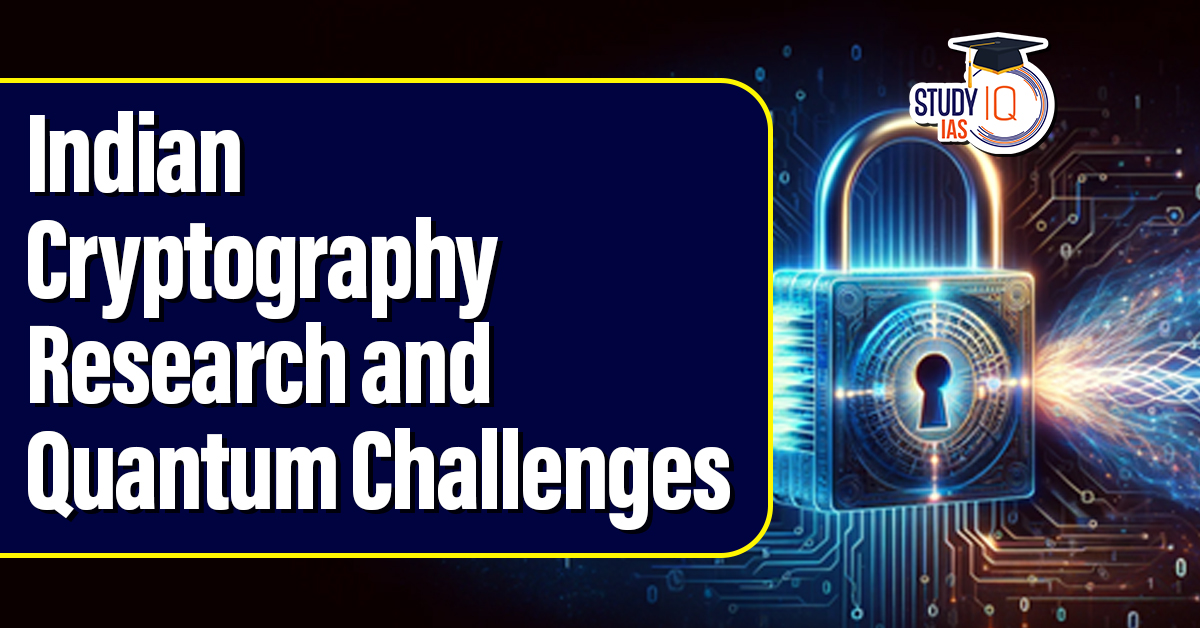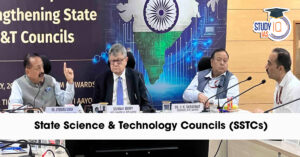Table of Contents
As India invests heavily in cryptographic research, securing sensitive information and enhancing secure communication channels have become critical priorities. With the advent of quantum computing, cryptography must evolve to address emerging challenges and risks effectively.
About Cryptography
Cryptography, the science of securing information, ensures that only authorized individuals can access sensitive data. By transforming readable information (plain text) into an unreadable format (ciphertext), it creates secure communication pathways essential in today’s digital age.
Key Concepts in Cryptography
- Encryption: The process of converting plain text into ciphertext using a key to secure information.
- Decryption: Reverting ciphertext back into plain text, requiring either the same key or a corresponding one.
Importance of Cryptography
Cryptography plays a pivotal role in:
- Protecting sensitive information: Safeguarding bank details, emails, and medical records.
- Enabling secure communication: Securing online shopping, financial transactions, and video calls.
- Ensuring privacy: Preventing unauthorized access to data in a rapidly digitizing world.
Types of Cryptography
- Symmetric-Key Cryptography:
- Uses the same key for encryption and decryption.
- Analogous to a single key used for locking and unlocking a door.
- Example: Advanced Encryption Standard (AES).
- Asymmetric-Key Cryptography (Public-Key Cryptography):
- Employs a pair of keys: a public key for encryption and a private key for decryption.
- Widely used in internet security protocols like SSL/TLS.
- Homomorphic Encryption:
- Allows computations on encrypted data without the need for decryption.
- Vital for cloud-based data processing and privacy-preserving computations.
- Quantum Cryptography:
- Leverages quantum mechanics principles to secure communication.
- Technologies like Quantum Key Distribution (QKD) offer virtually unbreakable security.
Technological Advances in Indian Cryptography
India has taken significant strides in cryptographic research and development, aligning with global advancements.
- National Quantum Mission (2023):
- Aims to establish satellite-based quantum communication over 2,000 km.
- Focuses on inter-city quantum key distribution and multi-node quantum networks.
- Quantum-Secure Satellite by ISRO:
- India’s space agency plans to launch a quantum-secure satellite to enhance national security and secure communication.
- True Random Number Generation:
- Crucial for creating secure private keys and passwords, this innovation reduces vulnerabilities in cryptographic systems.
- Indian researchers recently published a paper on generating true random numbers, showcasing their contributions to global cryptographic research.
Challenges in Cryptography
Threat from Quantum Computers
Quantum computers, with their immense computational power, can solve problems that traditional systems find insurmountable.
- Many current encryption systems, like RSA and ECC, could become obsolete.
- To counter this, researchers are developing Quantum-Resistant Cryptography (QRC), which can withstand quantum attacks.
Data Security Risks
With the growing reliance on cloud computing, robust encryption is critical to securing sensitive data.
- Reports reveal that 74% of organizations faced data breaches due to weak encryption practices.
- Enhanced encryption protocols are essential to prevent breaches during data storage and transfer.
Scalability and Implementation Issues
- As cryptography advances, integrating new systems with existing technologies poses challenges.
- The transition from conventional cryptography to quantum-resistant solutions requires significant investments and expertise.
Lack of Awareness and Training
- Many organizations lack the technical knowledge to implement robust cryptographic solutions.
- Training and awareness programs are necessary to strengthen cybersecurity infrastructure.
Way Forward
- Promoting Research and Development:
- Encourage academic and industrial collaboration to develop advanced cryptographic techniques.
- Fostering Quantum-Resistant Solutions:
- Invest in Quantum-Resistant Cryptography (QRC) to counter the potential threats posed by quantum computers.
- Building Secure Infrastructure:
- Strengthen critical sectors like banking, defence, and healthcare with quantum-secure communication systems.
- Awareness and Training:
- Conduct workshops and certification programs to educate organizations about cryptographic technologies and their implementation.


 Women in STEM Careers, Importance, Oppor...
Women in STEM Careers, Importance, Oppor...
 GLP-1 Drugs: Uses, Genesis and Developme...
GLP-1 Drugs: Uses, Genesis and Developme...
 State Science and Technology Councils (S...
State Science and Technology Councils (S...





















